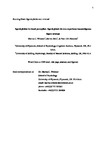Ego depletion in visual perception: Ego-depleted viewers experience less ambiguous figure reversal.
| dc.contributor.author | Wimmer, Marina | |
| dc.contributor.author | Stirk, S | |
| dc.contributor.author | Hancock, PJB | |
| dc.date.accessioned | 2017-03-02T10:53:38Z | |
| dc.date.issued | 2017-02-22 | |
| dc.identifier.issn | 1069-9384 | |
| dc.identifier.issn | 1531-5320 | |
| dc.identifier.uri | http://hdl.handle.net/10026.1/8580 | |
| dc.description.abstract |
This study examined the effects of ego depletion on ambiguous figure perception. Adults (N = 315) received an ego depletion task and were subsequently tested on their inhibitory control abilities that were indexed by the Stroop task (Experiment 1) and their ability to perceive both interpretations of ambiguous figures that was indexed by reversal (Experiment 2). Ego depletion had a very small effect on reducing inhibitory control (Cohen's d = .15) (Experiment 1). Ego-depleted participants had a tendency to take longer to respond in Stroop trials. In Experiment 2, ego depletion had small to medium effects on the experience of reversal. Ego-depleted viewers tended to take longer to reverse ambiguous figures (duration to first reversal) when naïve of the ambiguity and experienced less reversal both when naïve and informed of the ambiguity. Together, findings suggest that ego depletion has small effects on inhibitory control and small to medium effects on bottom-up and top-down perceptual processes. The depletion of cognitive resources can reduce our visual perceptual experience. | |
| dc.format.extent | 1620-1626 | |
| dc.format.medium | ||
| dc.language | en | |
| dc.language.iso | en | |
| dc.publisher | Springer Science and Business Media LLC | |
| dc.subject | Ambiguous figures | |
| dc.subject | Bottom-up processes | |
| dc.subject | Ego depletion | |
| dc.subject | Reversal | |
| dc.subject | Top-down processes | |
| dc.title | Ego depletion in visual perception: Ego-depleted viewers experience less ambiguous figure reversal. | |
| dc.type | journal-article | |
| dc.type | Journal Article | |
| plymouth.author-url | https://www.ncbi.nlm.nih.gov/pubmed/28229298 | |
| plymouth.issue | 5 | |
| plymouth.volume | 24 | |
| plymouth.publication-status | Published online | |
| plymouth.journal | Psychonomic Bulletin & Review | |
| dc.identifier.doi | 10.3758/s13423-017-1247-2 | |
| plymouth.organisational-group | /Plymouth | |
| plymouth.organisational-group | /Plymouth/Faculty of Health | |
| plymouth.organisational-group | /Plymouth/REF 2021 Researchers by UoA | |
| plymouth.organisational-group | /Plymouth/REF 2021 Researchers by UoA/UoA04 Psychology, Psychiatry and Neuroscience | |
| plymouth.organisational-group | /Plymouth/Research Groups | |
| plymouth.organisational-group | /Plymouth/Research Groups/Centre for Brain, Cognition and Behaviour (CBCB) | |
| plymouth.organisational-group | /Plymouth/Research Groups/Centre for Brain, Cognition and Behaviour (CBCB)/Cognition | |
| dc.publisher.place | United States | |
| dcterms.dateAccepted | 2017-02-01 | |
| dc.rights.embargodate | 2018-2-22 | |
| dc.identifier.eissn | 1531-5320 | |
| dc.rights.embargoperiod | 12 months | |
| rioxxterms.versionofrecord | 10.3758/s13423-017-1247-2 | |
| rioxxterms.licenseref.uri | http://www.rioxx.net/licenses/under-embargo-all-rights-reserved | |
| rioxxterms.licenseref.startdate | 2017-02-22 | |
| rioxxterms.type | Journal Article/Review |


